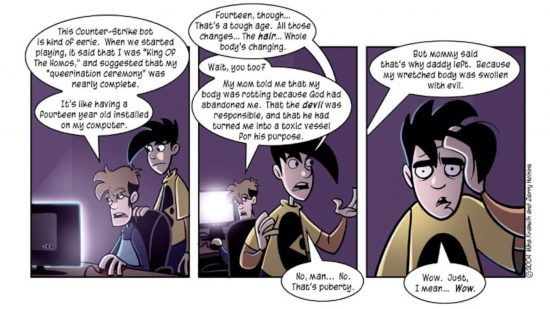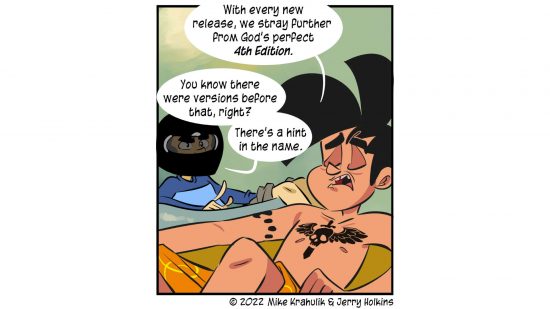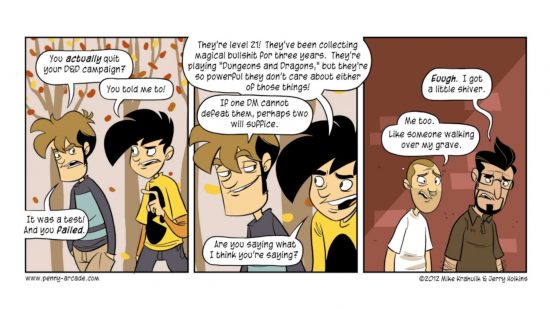Jerry Holkins, co-creator of the long-running webcomic Penny Arcade alongside artist Mike Krahulic, has to be a lot of people. As well as writing the gaming-focused gag comic, he’s the president of a nerdy media empire that has grown up around it. His self-insert character inside the comic is Tycho Brahe, a misanthrope, lexiphile, and pervert. Then there’s Omin Dran, a half-elf Cleric, Holkins’ character in DnD actual play series ‘Acquisitions Incorporated’.
Acquisitions Incorporated was one of the earliest professional DnD actual plays, originally sponsored by Wizards of the Coast to promote DnD 4th Edition. It established the format that would propel shows like Critical Role and Dimension 20 to fame.
In a recent interview with Wargamer, Holkins told us about his life with Penny Arcade and DnD. In part one of that interview, Holkins explains how growing up during the Satanic Panic shaped his relationship with tabletop roleplaying games as a whole, making him far more interested in group dynamics than the mechanical specifics of DnD Classes and DnD Races.

When did you start playing DnD?
The very first time I ever played Dungeons and Dragons, I was actually six years old. My father hailed from a Mormon realm, and at that time that could stereotypically mean that the family was quite large. There were ten children if I recall correctly, and he was the eldest of that group. By the time I was born he had brothers and sisters who were not that much older than me.
And so I would spend the night at my grandmother’s house, as you often do, and they introduced me to this game. And I can still remember some of the imagery from it, which to me means it must have been a very emotionally salient experience. I have a full sensorium for a couple of moments in this game, I can just go back to it and walk around in it.
Were games a big part of family life?
I grew up with them. Board games and puzzles were super, super big in my dad’s family, because I think that it must have been a survival necessity in that house.
I remember coming home and telling my mom about this incredible game that I had played at my grandmother’s house with my uncles and aunts. This would have been 1982, smack dab in the middle of the Satanic Panic, and we were a quite religious family as well. And so I got into massive, massive trouble.
Living through it, what do you think was at the root of the Satanic Panic?
I hadn’t done anything satanic, I hadn’t engaged in some kind of a ritual. This was a storytelling experience, it was no more dangerous than any other type of fiction. But of course, fiction is a very, very dangerous thing, because fiction has an unparalleled capacity to expose venality and wickedness.
And so it has to be rigorously policed at every turn. And so this is a mode, a system or mechanism for imagining – that absolutely has to be brought to heel.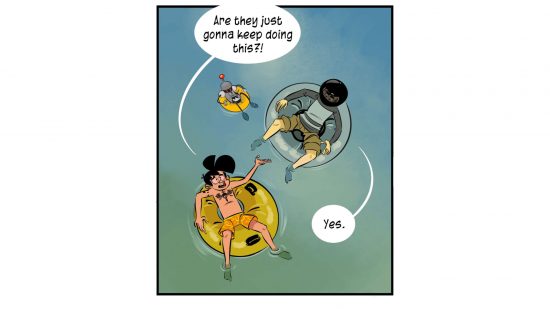
So did that result in you not being able to play RPGs?
As an adolescent, I still played role playing games. But because there was an actual pronouncement against playing DnD, I had a chance to experience the whole of the medium in one of its most fecund periods. Honestly I consider it a blessing. I think that a lot of people start with DnD, and they stay with DnD.
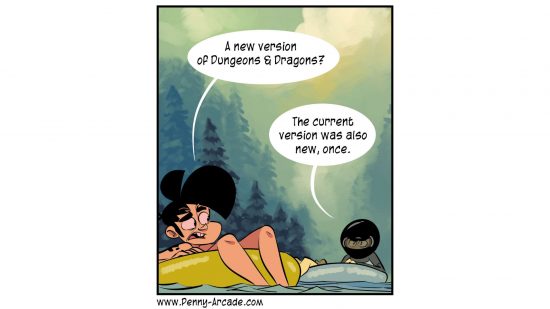
So what kind of games did you play instead of DnD in those formative years?
Traveller, Robotech, Ninjas and Super Spies, Teenage Mutant Ninja Turtles, the storyteller games from White Wolf; Vampire, and Mage was a personal favourite, as well.
Eventually, I started playing D&D again in secret, but that was only when I was an older teen and required some mechanism for rebellion. I mean, eventually I would come to rebel quite firmly, but that middle period was the safest, most ordinary mode of rebellion.
We had planned to ask if any classic DnD modules informed your DM style, but it seems it’s a lot broader than that…
Oh, very much. My DnD play is all informed by these other games. Classic modules are very comparatively video gamey. Classic modules are a keyed map with a bunch of specific things – occasionally there’s going to be text that you might read, but it’s almost like a competitive wargame, with profoundly high lethality. The story is what you can add back in there, and the theme is, typically “This place is bad. This is a yucky realm”.
Whereas in the games that I run, a dice might not get picked up in a whole session. But there are a lot of indie systems that I think do DnD really well that aren’t DnD.
What’s your favorite not-DnD system for running DnD-like games?
Probably my favorite system of that kind is Burning Wheel – there’s a lot of variants that use it, like Mouse Guard, or Torchbearer. Torchbearer is basically a paean to Old School DnD – which is essentially a type of gruesome survival horror – and its systems allow for that.
In DnD, statistically you’re statted up like a wargame model. Your basic numbers are all in relation to this very specific task, and as a result, there’s a lot of atomization [between players] there, especially when it comes time to engage in battle or any type of conflict. Everybody is doing their own thing.
Whereas Torchbearer basically says that that’s not possible. No matter what, your actions are going to have an effect on the party. You’re part of a group, you can’t really escape from it, and this is how you affect the world.
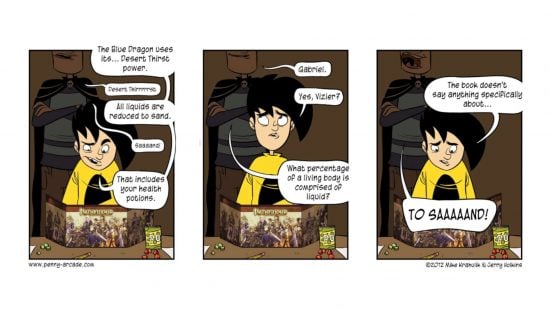
When it comes time to have a conflict – and that can be physical, but it can be rhetorical, it can be a chase scene, it all uses the same resolution system – the whole party generates what’s called resolve. That is essentially the group’s HP, their ability to endure whatever type of challenge is in front of them.
We’re all in there, we’re all physically helping each other and literally lending another player one of our dice for checks and things like that. The social space that it provides and models I think is really, really fun – I try to bring that kind of feeling to Dungeons and Dragons.
Thanks Jerry!
There’s more to come from our interview with Holkins, so stay tuned. If you’d like to stretch your RPG tastes beyond DnD, Wargamer has guides to holiday tabletop RPGs, horror RPGS, solo RPGs, Warhammer 40k RPGs, as well as introductions to Pathfinder classes and Pathfinder races if you’re not keen on treading too far afield.
Source: Wargamer



